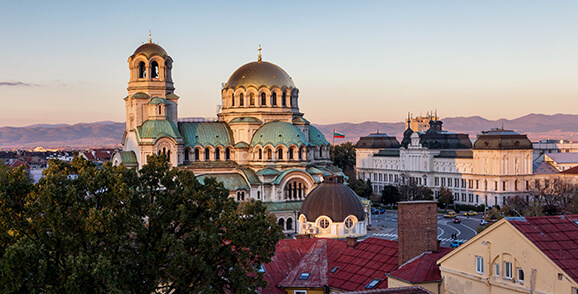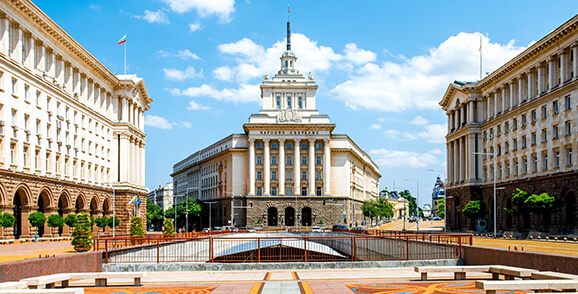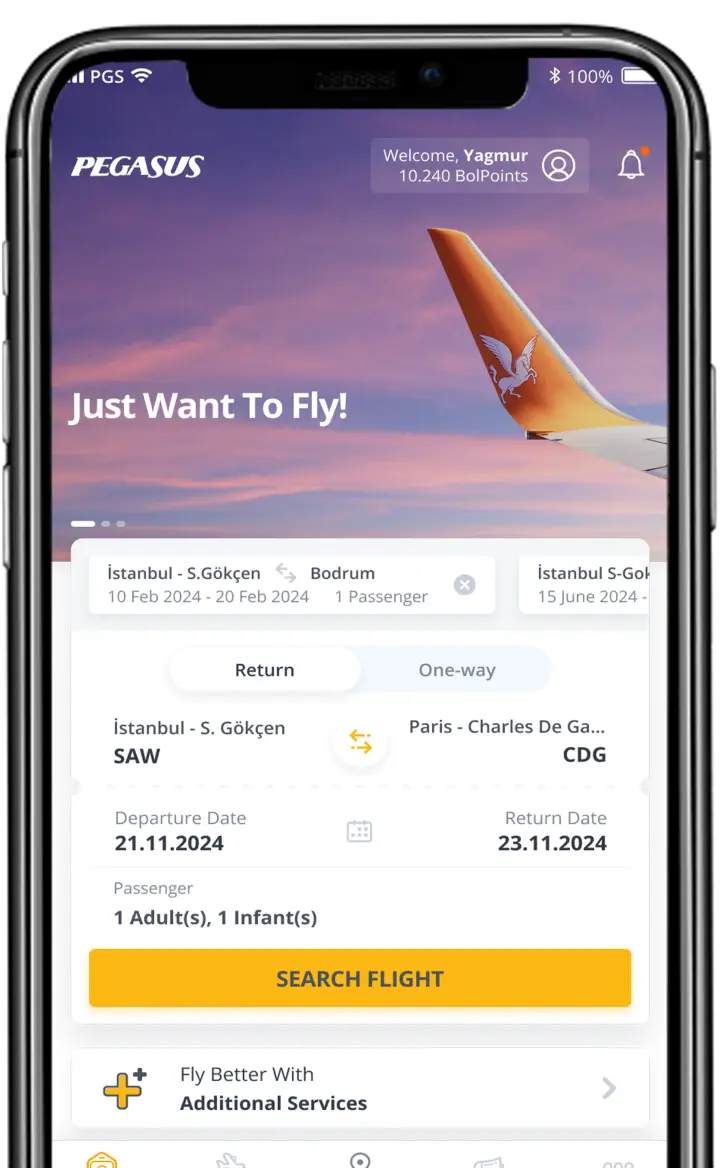
Bulgaria Travel Guide
Contents
Bulgaria is among the leading countries of the Balkans with its cities that have hosted many civilizations, historical buildings and rich cultural heritage. In addition to its cultural and historical heritage, the country is known as one of the attractive tourism destinations with its deep blue sea, kilometers of beaches and stunning beaches. The country, which has a fascinating atmosphere with its magnificent mountains and natural beauties, promises a different holiday experience to its visitors with its colorful nightlife and delicious food.

General Information about Bulgaria
| Continent: | Europe |
| Capital of Germany: | Sofia |
| Country Code: | BG |
| Language: | Bulgarian |
| The difference between GMT: | GMT+2 |
| Telephone Code: | +359 |
| Domain Extension: | .bg |
| Currency: | Bulgarian Lev (BGN) |
| Area: | 110.994 km² |
| Climate: | Temperate Continental Climate |
| Vegetation: | Steppe, Forest |
| Livelihoods: | Food, mining, tourism, chemical industry |
| Socket Type: | 230 V, 50 Hz, C / F |
Official Language of Bulgaria
The official language of Bulgaria is Bulgarian. In addition, Romani, Turkish and English are widely used in the country.
Common Phrases
Da = Yes
Ne = No
Zdrasti = Hello
Blagodarya= Thank You
Dobro Utro= Good Morning
Dobır veçer= Good Evening
Ako o’biçate= Please
Moje li Simetkata= Check please?
Znaesh Angliski?= Do you know English?
Capital of Bulgaria
The capital of Bulgaria is Sofia. Sofia is also the country's largest and most important touristic city.
Location of Bulgaria
Bulgaria is located in the Balkan Peninsula on the European continent.
Population
According to the data for the first half of 2022, the population of Bulgaria is approximately 7.2 million.
Local Time
Bulgaria is located in the GMT+2 time zone. There is no time difference with Turkey.
Currency in Bulgaria
The official currency of Bulgaria is the Bulgarian Lev (BGN).
Area of Bulgaria
Standing out with its rich historical and cultural heritage and unique architecture, Bulgaria has a surface area of 110,994 km².
Regime
Bulgaria is governed by parliamentary democracy. The top level of management consists of the President, the Prime Minister and the Council of Ministers, who are directly elected. The President, members of the National Assembly and local governments are elected by election. Ministers are appointed by the President.
Climate and Nature of Bulgaria
The climate of Bulgaria is a temperate continental climate. The summer months in the country are quite hot. The winter months are very cold and there is mostly snowfall. According to the climatic features, the vegetation of Bulgaria is steppe in the flat parts, and forest in the mountainous and more temperate regions.
Economy and Livelihood
One of the most important livelihoods of Bulgaria, which has important touristic points, is tourism. In addition, mining activities have a large place in the country. In addition, the machinery and chemical industry, the oil industry and the food trade are among their livelihoods. Agriculture and animal husbandry are also carried out in favorable areas in the country. Especially poultry and silkworm breeding are highly developed.
Provinces of Bulgaria
Bulgaria, one of the Balkan countries, has 28 cities. Sofia, Vrana, Plovdiv, Burgas, Pleven, Stara Zagora, Dobrich and Sliven are the most important cities of the country.
Where is Bulgaria?
Bulgaria is a country located in the eastern part of Europe on the Balkans side. It is bordered by Romania in the north, Turkey and Greece in the south, Serbia and Macedonia in the west, and the Black Sea in the east of the neighboring country.
Best Time to Visit
Bulgaria is a country that offers different holiday options in terms of tourism and can be visited in all four seasons. With the effect of the continental climate seen in the country, the air temperatures start to increase as of May. In this direction, if you want to have a unique summer holiday in Bulgaria, July and August will be the ideal period. On the other hand, if you are going to visit the country for a pleasant snow holiday, you can plan your trip for December, January and February. In addition, by determining the date you will go according to the festival periods, you can have the opportunity to get to know the local culture closely and make your trip more colorful.
Festivals in Bulgaria
- The International Festival of the Masquerade Games “Surva” (January / February)
- Kukerlandia Festival (February)
- Carnival of Humor and Satire in Gabrovo (Middle of May)
- Bulgaria Salsa Festival (May)
- Rose Festival in Kazanlak (First week of June)
- Varna Summer Festival (June)
- Meadows in the Mountains (Early June)
- Cherry Festival in Kyustendil (June)
- Varna International Music Festival (July)
- Plovdiv International Folklore Festival (July)
- International Jazz Festival Bansko (Beginning of August )
How to Get to Bulgaria?
The landing point for Pegasus flights to Bulgaria is Sofia International Airport (OF).
You can travel to Bulgaria quickly and comfortably with the flights organized by Pegasus Airlines. Pegasus Airlines offers direct flights from Antalya International Airport (AYT) to Sofia International Airport (SOF) in the capital Sofia. You can reach other cities by bus from Sofia. You can also choose connecting flights via Antalya to reach Sofia, the capital of Bulgaria, from different points.
Public Transportation in Bulgaria
In Bulgaria, which has a highly developed transportation network, public transportation is provided by bus, tram and metro. Buses operate between 05:00 and 23:00 every day. You can use the metro, which offers fast and comfortable transportation, between 05:00 and 00:00. In addition to public transportation vehicles in the country, you can prefer taxis and you can quickly reach the region you want. You can also consider the option of renting a car for more free transportation.
Transportation from Sofia International Airport to City Center
Flights organized to Bulgaria are landed at the Sofia International airport. Sofia airport is 10 km from the city center. There are bus and metro options to reach the city center. You can reach the city center economically and quickly by bus and m1 metro from the 2 main terminals in the airport. You can also go to Sofia city center by taxis at the taxi stands at the airport.
You can benefit from the car rental service with Pegasus Airlines privileges to freely travel the country on the route you choose.
Places to Visit in Bulgaria
Varna, which has a great potential especially in terms of summer tourism with its azure sea and beaches, also fills the eye with its historical and cultural texture. The country, which has a different richness in every corner, offers culture and art lovers a pleasant holiday thanks to its deep-rooted history and admirable historical buildings, museums and art centers.
Sofia

Sofia, the capital and largest city of Bulgaria, is one of the cities that stand out with its historical and cultural riches. The city, which is fascinating for its natural beauties and historical buildings, promises a pleasant holiday experience with its nightlife entertainment and delicious local dishes. Sofia Archaeological Museum, National Art Gallery, National Museum of Natural History, Boyana Church and Sofia Zoo are the main places you must see in the city.
Plovdiv
Plovdiv is one of the historical centers of Bulgaria. It has hosted many civilizations from the Kingdom of Macedonia to the Roman and Ottoman Empire. Knyaz Alexander Street stands out as the busiest and most central street of the city. One of the most striking places of the city is the Roman Ancient Theater, which is visited by thousands of tourists every year.
Varna
Varna, one of the cities of Bulgaria famous with its nightlife, also has many historical riches. Promising a unique summer holiday with its deep blue sea and beaches, the city is one of the main regions of the country's summer tourism. The most important places to visit in Varna are Varna Cathedral, Clock Tower, Opera House, Roman Bath, Ethnographic Museum and Preslav Street.
Burgaz
Burgas is one of the most touristic cities in Bulgaria with its beaches, lakes, lively city life, museums, attractions and city activities. The most popular, crowded and largest street in Burgas is Alexandrovska street. There are many shopping stores, restaurants, fast-food shops and cafes on the street. One of the remarkable structures of the city is the Soviet Statue in Troikata Square. Regional History Museums, which reflect the historical structure of the city, are among the structures worth seeing in the city.
Bansko
Located at the foot of the Piri Mountains, Bansko is one of the ideal routes for those looking for a ski holiday. In addition, Pirin National Park and Trinity Virgin Mary Church, which are on the World Heritage list by UNESCO, are the most interesting places in the city.
Where to Stay in Bulgaria?
Bulgaria, which hosts a lot of tourists both winter and summer tourism, offers accommodation options that appeal to every budget. If you want to spend a pleasant holiday in a luxurious and comfortable place, you can choose 5-star hotels in the central regions. You can stay in boutique hotels and hostels for a peaceful and quiet holiday experience in historical buildings with impressive architectural designs.
The cities with the most accommodation options in Bulgaria are the capital Sofia and Varna. You can choose Oborishte, Lozenets, Todor Alexander Boulevard and Vitosha Boulevard to stay in Sofia. In Varna, you can evaluate the Central Beach and Sea Garden regions, where there are luxury hotels close to the sea.
What to Eat Bulgaria?
Bulgaria has a rich culinary culture with traces of Mediterranean, Ottoman, Russian and Turkish cuisine. Food is consumed a lot in the country and kebabs are one of the most popular local delicacies. Bulgaria has a wide range of dishes in terms of soup, salad and pastries. Pileska, bob chorba, tarator and shopska salad, Banitsa and tikvenik are among the most famous dishes. Sarma, moussaka and baklava are flavors similar to Turkish cuisine. Lömbedek and funiyki are the most popular desserts.
Other famous regional delicacies you should try in Bulgaria can be listed as follows:
- Meshana Skra
- Shkembe
- Stuffed peppers
- Kebapche
- Lozovi Sarmi
- Rakia
Shopping in Bulgaria: Best Souvenirs to Buy
There are many souvenir options in Bulgaria for yourself and your loved ones. Rose oil and rose-flavored products are very famous in the country. Especially rose-flavored perfumes, soaps, lotions and creams are especially popular souvenirs. In addition, silver trinkets, jewelry, hand-embroidered towels and napkins and ceramic items are among the souvenir alternatives you can buy on your way back from Bulgaria.
Cheese varieties are very famous in the country where there are many options in terms of local products. Kashkaval cheese and siren cheese are the most famous cheese varieties. You can also visit local markets and buy Bulgarian wine, Bulgarian Turkish delight and coffee varieties.
Nightlife in Bulgaria
Bulgaria is among the countries that attract tourists with its colorful and vibrant nightlife. Night entertainments are held in nightclubs and bars in many cities of the country, which continue until the morning. Especially the capital Sofia and Varna are one of the most remarkable cities of the country in terms of nightlife.
Entertainment in different concepts is organized in nightclubs and bars in the country. In addition to traditional Bulgarian music, you can have fun with different music genres such as pop, jazz and rock. On the other hand, you can experience local delicacies and relieve the tiredness of the day, accompanied by live music in cafes and restaurants.
Things you need to know before traveling to Bulgaria
- If you use a debit or credit card in the country, you may encounter extra commissions, especially in local markets. In some places, you may experience a low exchange rate problem. For this reason, it will be useful to have Bulgarian Lev with you.
- When choosing meat and delicatessen products in the country it will be useful to ask about the ingredients.
- People across the country can easily speak and understand English. So if you don't know Bulgarian, you can easily communicate in English.
- In Bulgaria, the winter months can be quite cold, especially during the night. Therefore, do not forget to take with you thick clothes suitable for seasonal conditions.
- Tap water is drinkable.
Essential Numbers
Country Code: +359
Sofia International Airport: +359 2 937 2211
Emergency: 112
Holidays in Bulgaria
- New Year’s Day – Jan 01
- The Liberation Day - March 03
- Gergyovden (St. George’s Day) – 6 May
- Bulgaria Unification Day – 6 September
- Bulgaria Indepence Day – 22 September
- Christmas Eve – 24 December
Visa Requirements
Bulgaria grants visa-free entry to certain countries with the bilateral agreements it has made. Bulgaria is not a Schengen member. However, as of 2007, Bulgaria became a member of Europe and accordingly, Schengen visa holders can enter Bulgaria without a visa for their travels up to 90 days. However, in cases where the Schengen visa will be used for the first time, the Bulgarian trip must be made from the country where the Schengen visa is obtained. Some other nationalities are subjected to various visa rules to enter Bulgaria.
You can find detailed information about Bulgaria visa requirements and visa application process on the Bulgaria Visa Guide page.
FAQ About Bulgaria
Frequently Asked Questions
What does the Bulgaria Flag mean?


The Bulgarian flag consists of white, green and red stripes of the same thickness from top to bottom, respectively. On the Bulgarian flag, the white color is the indicator of peace, the green color is the fertile and fertile lands, and the red color is the indicator of the blood spilled for the independence of the country.
In what time zone is Bulgaria located?


Bulgaria is located in the GMT+2 time zones.
Do people in Bulgaria understand English?


Yes, most people in Bulgaria speak and understand English.
Is tap water drinkable in Bulgaria?


Yes, the tap water is clean and drinkable in Bulgaria.
How many days do Bulgarian visa applications end?


Applications for a visa to Bulgaria, except in exceptional cases, are completed on average within 10 working days.
How much are the flight tickets to Bulgaria?


Flight ticket prices to Bulgaria vary according to the period of your travel. Summer months are the periods when the country hosts the most tourists and ticket prices are higher. You can access Bulgaria flight schedules and flight ticket price information by visiting the Pegasus Airlines website.


